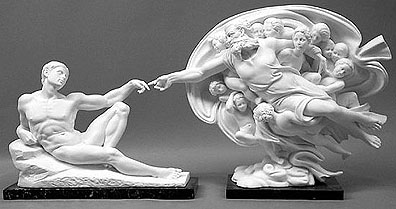
Journalism and the Two Mandates: the role of journalism in creation and mission
The idea of vocation is particularly Christian. In ancient Greece leisure was the only end of any work and so work itself was not seen as a vocation. All labour was seen as slavish. In Hindu religious culture, the focus is on fulfilling one duty. Work was a part of such duty. Work itself was not a vocation.
The Christian reformers of the 16th century Europe developed an understanding that equated vocation with work. “Through work we continue and take forward the process of creation begun by God.” Karl Barth stressed that the Christian fulfills his or her vocation within the job. Through his vocation, a Christian brings transformation into a fallen world.
The fall did not lead to withdrawal of gifts, qualities and skills to steward the world. It only led to their spoiling, cutting loose rule over the earth from a relation-ship with the creator God, human knowledge from God’s wisdom and God’s future from human self-assertion. The journalist’s vocation is to address the world as to reclaim it for God.
The Christian journalist approaches the power interests and power plays that rule human society and nature from the perspective of Christ’s Lordship already at work in the world. The Holy Spirit moves the world to its fulfilment in God’s purposes for it. Such a view relativizes all human power interests and identifies the power that brings lasting transformation.
The Christian journalist sites human society in a moral space, a space in which questions arise about what is good and bad, about what is worth doing and what is not, what has meaning and importance and what is trivial and secondary. The Christian journalist must identify believing Christian communities where such a moral framework operates and highlight their experience and testimony.
The Christian journalist recognizes that God shapes his world primarily by love. This love refuses to lose what is created and deals with society in both judgement and grace.
The resurrected Jesus announced to his disciples, “All authority in heaven and earth has been given to me. Therefore go and make disciples of all nations – teaching them to obey everything I have commanded you.” The mandate to share the goodness of Christ and make disciples of all people is predicated on the authority invested in Jesus as the Son who suffered, died and rose again to life. The promise of God that he will create a new heavens and a new earth and that the earth will be filled with His glory is guaranteed fulfilment as the Son is empowered in heaven and earth to move them towards their destined consummation. The authority of Christ, not only as the first born through which creation came into being but also as the Agent of the new creation reconciling all creation in himself is shared with Christ’s disciples. The disciples are in turn empowered to be stewards of God’s purposes to draw all peoples into discipleship and obedience. The disciples are stewards of the good news as much as stewards of the earth. Both are aspects of their identity as God’s children bearing God’s image.
God’s actions in the world of promise and fulfilment, of judgement and grace; the presence and work of his Son; the continuing work of his Spirit, convincing, convicting the world and moving it to its destiny place a demand on his disciples to recognize their obligation to accept God’s mission as their mission and live accordingly. The calling of every Christian to be a witness is strongly underlined by Luke and John. You are witnesses, you will witness, and you must testify for you have been with me. Witness is a public act. It is going public with a personal experience of Christ. Most cultures expect personal experiences especially intense ones to be kept private. Jesus calls on his disciples to go public with their very intense personal experience of him. A testimony and a witness is a public act. Each Christian is called to public acts of witness. He/she is empowered for such acts but as the Christians in the early church knew well, any public testimony to Christ is costly.
What is the nature of such public witness for Christians in journalism?
1. “We have heard, seen and touched.”
The first Epistle of John begins with a ringing testimony and witness. ‘That which we have heard, which we have seen with our eyes, which we have looked at and our hands have touched – this we proclaim concerning the Word of life.” The contemporary idiom “been there, done that” pales against the depth of the testimony of those who paid for it by their lives. The Word which they found in the text of the gospel and in the person of Christ brought them life of a quality which nothing on earth could destroy.
2. Naming the name
Public witness is ineffective if it is vague.
The heart of Christian public witness is naming Jesus as the one who connects our lives with God’s purpose for us. It is again Jesus who connects creation with God and ensures that God’s design for it is fulfilled. Asian religions and philosophical traditions deny that we can know God in himself. We can know God only in his manifestations to humans. The Christian Fathers (in the East) asserted that Jesus is not only the God we can know, but God as he is in himself, the true God. Contemporary principled pluralism relativizes Jesus. Jesus is not a vague cosmic idea inclusive of the best we can know about God, but God in fulness revealing himself in human history. Jesus’ incarnation enfleshes God in history and his humanity confirms that God in himself is knowable to us as humans.
The Jesus we name is not just a teacher of ideas and truth. He is the centre of a community of people in history who grasp his life in their community as his body and express that life in acts of compassion and witness. This Jesus is translated into each culture and context in which his community exists and in the sharing of all global communities, the Jesus who unites all of creation becomes visible.
3. Anticipating the Kingdom of God
Another dimension of our public witness is the way we anticipate the Kingdom of God. As Christians we are part of God’s Kingdom. We are called to announce it and anticipate it. As we anticipate the kingdom, we reject earthly utopias and warn human society about all such utopic ventures. We also reject the notion of any end of history. History as we know it now will only end when the kingdom is consummated. History still moves in anticipation of the King’s return.
Anticipating the kingdom involves vigorously offering to all human societies the values of the kingdom. Compassion, justice, responsibility, stewardship, fruitfulness, servanthood, reconciliation, holiness of life, faithfulness in relationships are all values of the kingdom by which all human societies will be evaluated. These values are offered as proleptic possibilities leading to their fulfilment in the future.
Anticipating the kingdom includes identifying the forces of darkness which seek to overwhelm the length of God’s truth and close off human societies from moving towards their destiny in the kingdom: a fierce commitment to protect and defend God’s truth, to keep the lamp of the gospel of truth shining and support all who pay a high price in keeping it from being put out.
The kingdom is a community of the king but is constituted by individual persons who have personally acknowledged the king and accepted his Lordship. They recognize their integral relationship with others in the community but recognize that the image of God in humans is as profoundly personal as it is corporate. Anticipating the kingdom requires the promotion of individual responsibility and choice not to achieve individual autonomy but to ensure freedom in choosing to love and serve God and neighbour.
Conclusion:
The two mandates of creation and mission are two sides of the one calling to stewardship. As humans made in God’s image we are empowered with stewardly responsibility for the earth and for the gospel of the kingdom. It is in the exercise of that stewardship we affirm our identity as God’s children and also fulfill our humanity.




Leave a Reply